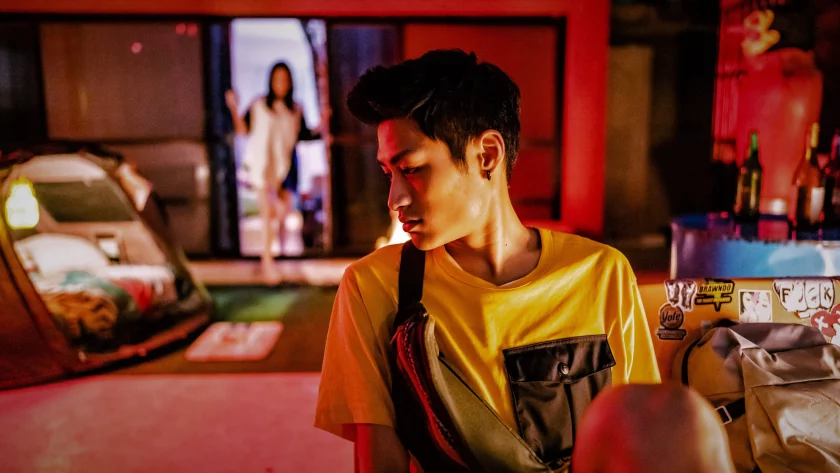LEAFF 2022 celebrates its seventh year with a programme of 43 films from celebrated and debut filmmakers. Championing East Asian cinema, LEAFF aims to bring a wide range of cinema to London and offer the opportunity to experience a new culture of cinema.
Jihai Li reviews Lou Yi-an’s provocative Goddamned Asura, an ensemble tale of teenage angst.
“I’ve forgotten how I pulled the trigger, but this is the first time I’ve ever felt that I have control over myself.” – Jan Wen
我忘記我怎麽開槍的,但,我感覺到這好像是我第一次終於能夠掌控我自己。——詹文
“Well I’m not as lucky as you.” – Zero to Jan Wen
沒你好命啦。——林嘉琳對詹文

As Taylor Swift’s Anti-Hero tops the charts, it is evident that people relate to this mantra where we get older but not ‘wiser’. It is supposed to be fun turning 18.
Through six main characters, director Lou Yi-an shows how anyone can be the problem. For 18-year-old Jan Wen, his wealthy family sending him abroad for university only makes him feel oppressed: he’s been following his parents’ expectations all his life. For his 18th birthday, he asks for nothing more but to stay in Taiwan. Seeing his mom’s hesitance, he’s evermore desperate to do something that’s not his parents’ idea. Inspired by the violent Indian demigod Asura in his favourite comic, he commits a random shooting. The only deceased is Sheng, an online streamer who is a stranger to Jan Wen. Trying to save his best friend and crush from severe punishments, Axing goes to extremes. Meanwhile, Sheng’s watcher, Wen’s crush, and math genius who could have stayed in school, Zero, is struggling to buy her mom a hearing aid and therefore earns illegal money. She bumps into Wen in prison. But what if Wen’s parents let him stay? Three other what-ifs of the story unfold as Wen refuses to admit that it would be any different.
The film tries to tackle humanity’s deepest sins and society’s sickest bits all at once: controlling, unaccountability, impulsiveness, dishonesty, sexism, poverty, and everything in between. Most commendable are the writing and acting. They develop the plot and characters in novel, subtle, and round ways. There’s no one main character, heroine, or villain: everyone is everything. However poor or rich, whatever gender and sexuality, they’re all struggling. In fact, as a multi-perspective film that enumerates every possibility, the story would work perfectly fine with any character being the protagonist. From Wen’s perspective, his family’s wealth is a burden: it places too many expectations on him. His dad wants to send him abroad to stop him from pursuing an animation career with Axing in Taiwan. Pulling the trigger on his DIY gun, Wen is the ‘hero’ of his own freedom – according to his definition of freedom being the ability to make decisions based on free will and bearing the consequences – but also a villain to the deceased. However, for Zero, Wen’s money would fix all her problems. A math genius who cannot stay in school because her alcoholic single mom needs a hearing aid that her family can’t afford, she deals drugs and goes on paid dates. But she does all this out of care for her mom. As such, there’s a fine line between hero and villain that everyone, as an anti-hero, is walking on.

The film’s excellent visual effects and cinematography also help in capturing this complexity and building up tension. The idea of telling the story backwards and opening with a vertical video taken on a phone creates a very strong, novel, and chaotic start to the film. As the film progresses, it treats the audience with delicate settings, lighting, colours, and a combination of comics and reality. This adds to Wen and Axing’s ‘naive heroism’ as passionate comic creators- especially for Axing, who documents his life through comics- it is his way of seeing the world. Frequently mentioning games and comics, the film also challenges the difference between those ‘fictional’ universes and life. The authors control everything in those universes – is real life also controlled by just one party? Is creating comics Axing and Wen’s escape to a universe where they have full control or merely a reflection of the real-life power dynamics? As Wen repeatedly points out Axing’s lack of creativity, the film keeps the theme of powerlessness and imperfection of individuals at the front and center.
However, the director tries to unpack so much about humanity’s weaknesses that it feels like three films squeezed into the volume of one. Deleting one storyline wouldn’t make the message less effective; focusing on one might make it better. It shows three alternative universes assuming Wen’s parents let him stay in Taiwan. Whilst covering every possibility, this eliminates room for imagination. The writer tries to show the audience ways in which every character can be both moral and evil that people might not realize, but misses opportunities to end the film at a cliffhanger to make the audience ponder further. However, the film creates so many excellent cliffhangers that it almost feels like a shame when the film carries on beyond them.
The film’s enumeration of possibilities only leads to one conclusion: we’re all goddamned. Everyone is a problem. But we’re largely unaware of it, and if we are, we blame it on others. Wealth is a spell. Poverty is hell. Love is powerless. Rage is a weapon. Life is a mistake-prone chain of events where no one has full control. And frustrated poets are calling it nobody’s fault – a euphemism for everybody’s fault. Well, isn’t this goddamned, humanity.
Watch the trailer for Goddamned Asura here:




